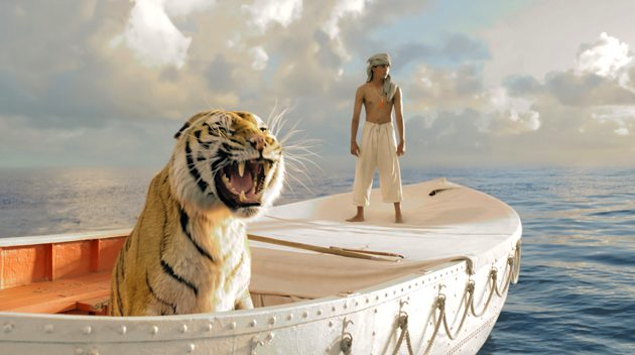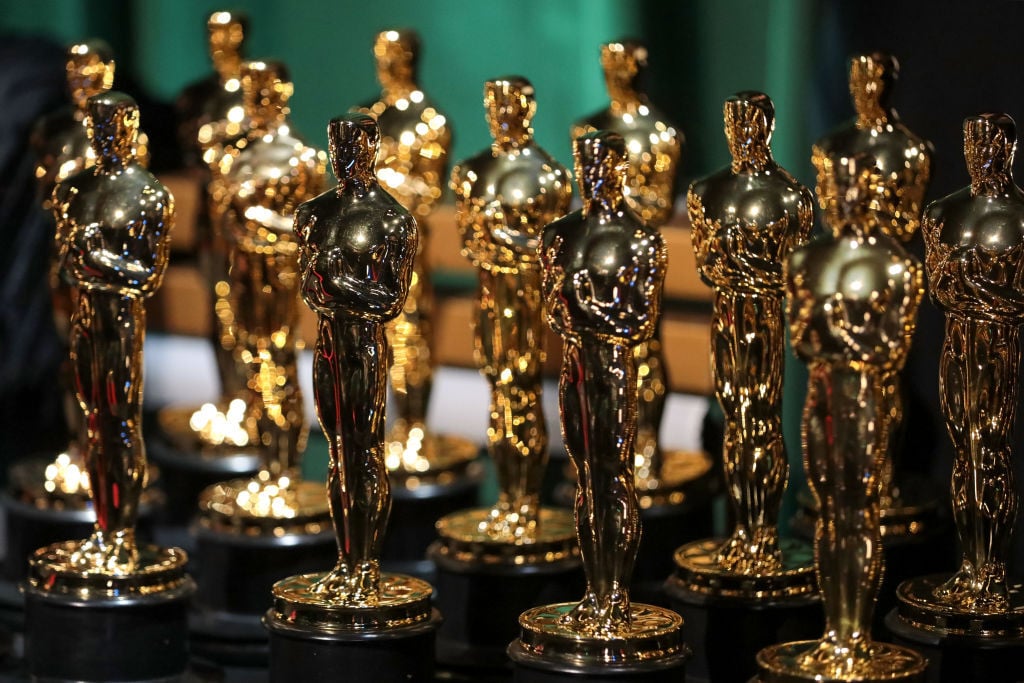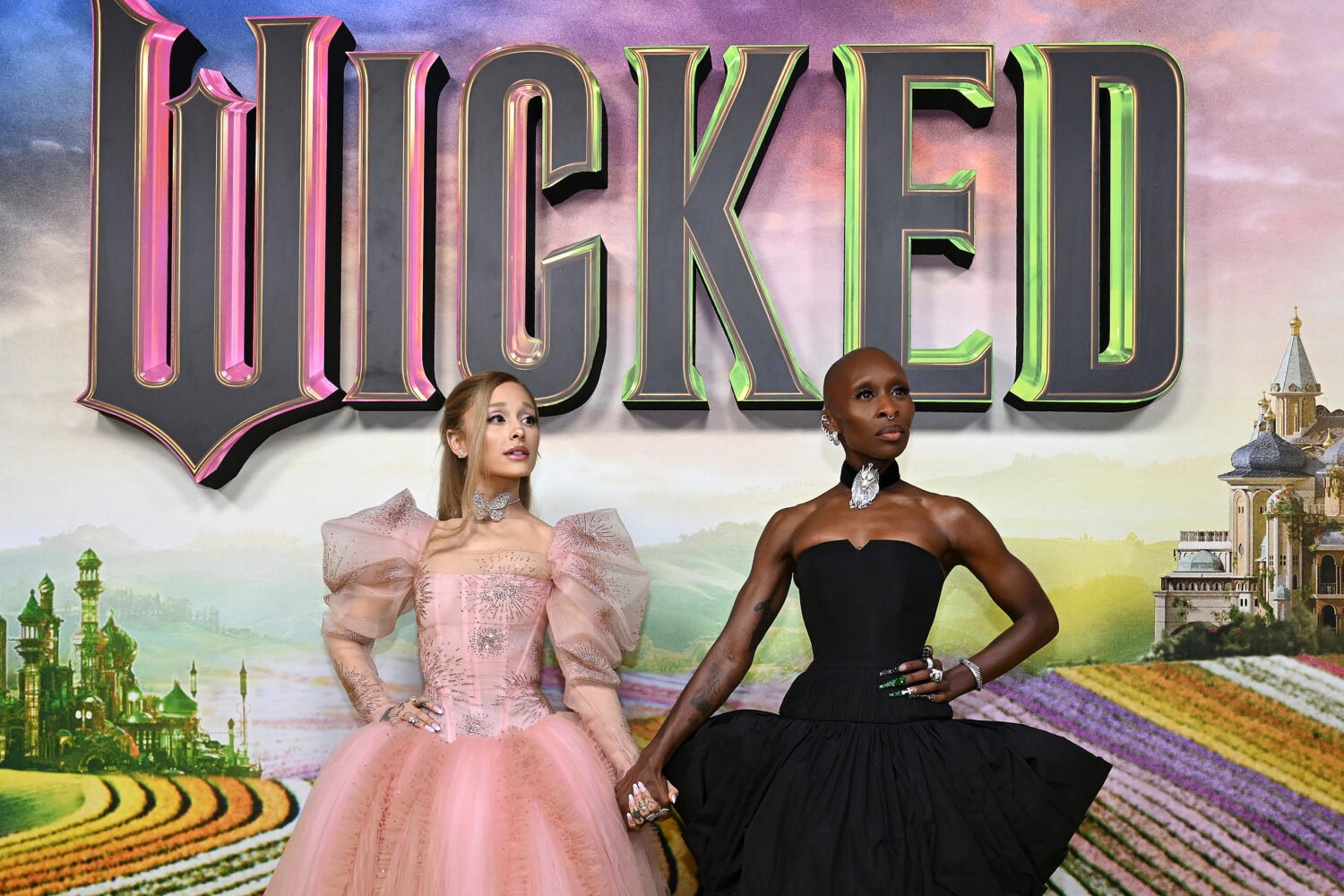Yann Martel’s 2001 novel,
Life of Pi, featured the magical realism-influenced story of a young man drifting in a lifeboat
on the Pacific Ocean for the better part of a year following a shipwreck. His only
companion in the boat as he spends his time trying to survive and reminiscing about
his past: a Bengal tiger. Ang Lee’s adaptation of the film is being hailed as a visual
marvel, the sort of thing that can sell even those annoyed by 3D and CGI on the technological
capabilities of those tools. Critics have been a little more lukewarm on the handling
of the inspirational and theological underpinnings of the story, but the general consensus
is that the film is so dazzling to look at, the deficiencies wind up being fairly
minor in Lee’s very grand scheme.
View the trailer. Opens today at theaters
across the area.
Hot on the heels of HBO’s look at Alfred Hitchcock’s attachment to
The Birds star Tippi Hedren, with Toby Jones in the lead role of that film, comes a peek at
the making of arguably Hitchcock’s most famous work, 1960’s
Psycho. Anthony Hopkins dons the makeup and fat suit for this one, which is based on Stephen
Rebello’s book and directed by Sacha Gervasi. This is Gervasi’s second outing as a
director, and his first narrative film, his first effort being the excellent rock
documentary,
Anvil: The Story of Anvil. The story pays particular attention to the influene of Hitchcock’s wife, Alma Reville,
a former screenwriter and assistant director herself, played here by Helen Mirren.
View the trailer. Opens Friday at Georgetown,
E Street, and Bethesda Row.
Sherlock Holmes and the Cinema: A century and a quarter
after his debut, Sherlock Holmes is as popular as ever, with ongoing visions of the
detective going on both British and US television and in the movies, not to mention
the non-Sherlock crime shows that still owe the entertainment value of his deductive
methods a debt of gratitude. In celebration of that 125th anniversary, the AFI has
gathered 18 films from the silent era through the defining work of Basil Rathbone
in the ’40s, nontraditional comedic takes from George C. Scott and Michael Caine in
the ’70s and ’80s, and the action-heavy Guy Ritchie/Robert Downey Jr. 2009 version.
Tarzan Centennial: Another character
celebrating an anniversary this year is Edgar Rice Burroughs’s Tarzan. The AFI has
the first two films from Johnny Weissmuller’s impressive run of a dozen films, which
began 80 years ago with
Tarzan, The Ape Man. That was followed two years later by
Tarzan and His Mate, in which director Cedric Gibbons and producer Bernard Hyman took advantage of the
relaxed standards of pre-Code Hollywood to show more skin than you might remember
in a 1930s Tarzan flick.
Alfred Hitchcock Series: With two movies
about Alfred Hitchcock out right now, the AFI is taking the opportunity to do a brief
retrospective of a handful of the thriller virtuoso’s best known films. Tonight, it’s
the subject the Hopkins film shows the behind-the-scenes details of,
Psycho. My personal favorite,
Rear Window, is scheduled for a convenient pre- (or post-, if you eat early) Thanksgiving diversion
tomorrow, and
North by Northwest and
Notorious will also screen in the coming days.
The Films of Ang Lee: One more retrospective timed
to coincide with a new release, this series celebrates the diverse career of Ang Lee
just as his latest,
Life of Pi, comes out. This is a nearly comprehensive look at Lee’s career, presented in concert
with the Freer Gallery, which is taking on some of the director’s earlier films. The
AFI screens most of his English language works, plus the international hit
Crouching Tiger, Hidden Dragon. Things start up Friday with what I’d argue remains his best film, 1997’s dark ’70s
family drama
The Ice Storm.
The Wizard of Oz
and
The Godfather
: In addition to all that, the AFI has special engagements this weekend for
The Wizard of Oz, screening every day from Thursday through Sunday, perfect for providing something
for visiting family to do, and showings Friday through Sunday of
The Godfather, which turns 40 this year.
Check the AFI’s schedule for complete listings.
Made in the midst of the most acclaimed portion of Luis Buñuel’s career, this 1970
film stars Catherine Deneuve as an orphan who is taken in by a wealthy nobleman who
transitions her from a daughter into a wife as she matures. But as she gets older,
she develops other plans and other loves. Based on a tragic novel by Benito Pérez
Galdós, things go badly for pretty much everyone in this incisive analysis of the
power dynamics of wealth, class, and relationships. The film recently underwent a
full restoration, and the screenings that begin at E Street this weekend are part
of the limited re-release of the film.
View the trailer. Opens Friday for one
week only at E Street.
German director Werner Schroeter is lesser known than many of his counterparts in
the New German Cinema of the ’70s, even though he served as an inspiration to many
of them, particularly the similarly excessive Rainer Werner Fassbinder, who directed
Schroeter in a number of his own films. Schroeter was active in theater and opera
as well as film and, though German, had a special affinity for Italy. That’s shown
especially in these two works screening this weekend at the National Gallery.
Palermo or Wolfsburg, from 1980, is an epic-length look at a young
Sicilian who emigrates to Germany for a job at the Volkswagen plant; the film won
the Goldern Bear at Berlin that year. From two years prior is
Kingdom of Naples, which Schroeter shot mostly in Italy, telling
a decades-long story of one family that reflects the politics and culture of midcentury
postwar Italy.
Palermo
screens Saturday at 4 PM, and Naples
screens Sunday at 4:30 PM, at the National Gallery of Art.
Free.
Blu-ray/DVD Pick of the Week:
Grave of the Fireflies
The most affecting film to deal with the human devastation of World War II isn’t a
sweeping, big-budget epic. It’s this intimate piece of Japanese animation—out on Blu-ray
for the first time in the US this week—about a brother and sister orphaned after an
Allied firebombing takes their mother and the military their father. Seita, the older
of the two, is forced to care for his young sister, Setsuko, after they are first
foisted on an opportunistic aunt who can only be bothered to put a roof over their
heads because it’ll mean more food for her. When things sour with her, the kids are
out on their own and take refuge in an abandoned bomb shelter as they try desperately
to find food to survive.
Produced by Studio Ghibli, the animation house best known for films like
Princess Mononoke and
Spirited Away, the film stands in stark contrast to those Miyazaki fantasies, a sobering look at
the effect of the war on the Japanese people. Director Isao Takahata, working from
a semi-autobiographical novel by Akiyuki Nosaka, balances the grim realities with
the whimsy of the children, Setsuko particularly, who is often able to find light
in the darkest places. All of which will be small consolation when you’re crying your
eyes out by the end, in a film that finds its way to a graceful and beautiful conclusion
that is actually far more comforting than all that death and destruction should allow.
Special Features: Complete storyboards, a pair of deleted scenes, and the original
Japanese trailer.

















